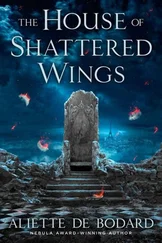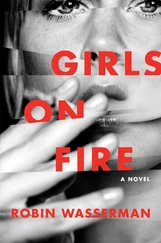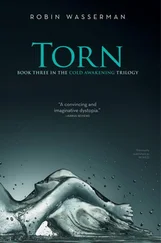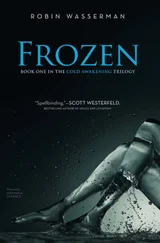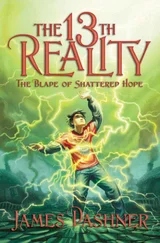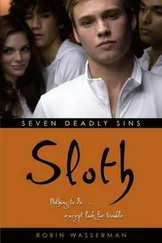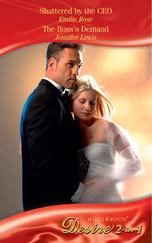“We’re protecting all of you,” Ben said.
“You’re protecting your investment .”
“You don’t want to become an object of fear and hatred.”
“I didn’t want to become an object at all,” I snapped. “But no one asked me.”
“Enough,” my father said. He didn’t have to raise his voice. “Ben, thanks for your assistance. Now, if you wouldn’t mind…”
“Of course,” Ben said smoothly. “I’ll be waiting in the car.”
We walked. In silence, at first, until Ben was out of sight. The secops headquarters looked like a silver pyramid that had been smashed with a giant sledgehammer, leaving behind a crushed jumble of razor-sharp points and jagged edges. The planes of the building jutted at awkward angles, so that wherever you stood, it appeared ready to topple over on your head. Covered in silver-plated panels, it likely gleamed in the sun—but on a day like this, like most days, the sky a swirl of murky grays, it nearly faded into the clouds.
We kept the station at our backs, and instead wandered through its carefully groomed gardens, which burst with the bright purples and pinks of tropical flowers, genetically coded to survive the cold. It was something I never would have noticed before the download, the way the flowers looked wrong, almost plastic, sprouting from the frost-tipped grass. My father stopped abruptly, staring down at a large pink blossom the size of a fist, its stiff petals barely flickering in the breeze. For a moment I thought he was going to pluck it—ill-advised as that would have been, given the fact that despoiling private gardens was illegal and this garden happened to belong to the secops. Besides, what would my father want with a flower?
Finally he looked up from the flower—to me. I didn’t like it. It was too easy to imagine what he was seeing, the machine that usurped his dead daughter’s life. The mistake.
In his eyes I wasn’t some wondrous machine, a marvel of modern technology. I wasn’t a mech, I was a skinner . A thing , just like the Brotherhood of Man said, the thing that the people in the corp-town and the city saw when they glared at me, the thing, the object , with the unnatural gait, the unblinking eyes, the man-made brain.
In his eyes I wasn’t a miracle. I was a desecration.
His hair was a different color than the last time I’d seen him, black instead of his natural blond. He was a vain man, but not about his appearance—that was my mother’s domain, and I could only assume that, as usual, she’d decided to mod her look and changed his to match. It made his skin look paler, throwing the lines ridging his eyes and mouth into sharp relief; past time for another lift-tuck.
There had been a time, when Zo and I were kids, that our mother had insisted we all conform to some Kahnian Platonic ideal. Blond hair, blue eyes, Zo and I with identical waves in our shoulder-length manes, our honey-haired mother towing our father like an accessory, the two of them looking enough alike to be siblings. It was popular in those days, families looking alike, parading their designer genes like a uniform, but Zo and I put a stop to it as soon as we were old enough to fight back. It had been years since the two of us had been a matched pair, and my mother had given up trying to keep pace. But she’d never before picked a look so drastically un-Kahn. Although—given the metallic purples and silvers glimmering across my body—I wasn’t looking very Kahn myself these days.
No one watching us together would guess we were father and daughter.
“Do you mind if I…?” He broke off, then folded me into an awkward hug, his body stiff and unyielding against mine. Or maybe it was my body that was unyielding, my arms that stayed at my sides. “That’s from your mother,” he said, letting go, staring at the stupid flower again.
“Oh. I guess, give her one for me too?” It was hard to imagine. The last time I’d seen them touch, I was lying in a hospital bed. I couldn’t remember the time before that.
“You could do that yourself,” he said.
So we were done with small talk and onto the main event. “I’m sorry,” I said. I’m not sorry. “For leaving like that.” But not for leaving.
“Without saying good-bye?” he asked. “Or telling us where you were going? Telling us anything ? Yes, I guess you would be sorry.”
Now I was the one staring at the ground. “It was easier that way.”
“For you,” my father snapped.
“Sorry,” I mumbled again.
“Your mother thought…” He shook his head. “You know how she gets.”
I tried to catch his eye, hoping for a smile. It was one of the things that brought us Kahns together—me, my father, and Zo, at least. We all knew how my mother got. But he wouldn’t look at me.
“But you knew where I went,” I said. “Because you’ve been watching me.”
“Can you blame me?”
“I had to leave,” I said.
“I realize you think that.”
“This is better.”
“I realize you think that too.” He frowned. “Though I can’t say I understand why.”
I wasn’t about to tell him what I’d seen, that I knew he felt obligated to treat me like a daughter and pretend everything was the way it used to be, even if it was tearing him apart. My father didn’t do weakness. Another reason my leaving was a gift to him. “How’s Zo?” I asked instead.
“She misses you.”
No, she missed her sister. As far as she was concerned, I was just an imposter, come to steal her sister’s identity and life. So Zo had stolen it first. Starting with Walker. But I wasn’t about to ask my father if Zo was still sleeping with myex-boyfriend.
I didn’t even care anymore. Walker felt irrelevant. I remembered wanting him, I just couldn’t remember why. Zo was welcome to him, as she was welcome to all my old friends and old clothes, my old spot on the track team, my old spot as favorite daughter. Only daughter.
“She didn’t want me there,” I said.
“She’s a child. She doesn’t know what she wants.”
“She’s only two years younger than me,” I pointed out. Waiting for the inevitable: Y ou’re a child too.
You don’t know what you want.
Come home.
But he didn’t say it.
Your sister misses you. Your mother misses you. Never I miss you.
It started to rain. My father glanced up, looking annoyed that the weather would dare interrupt him, then down at his shoes, already spattered with grime from the fat, filthy raindrops.
“Whatever you were doing in that corp-town,” my father said, steering us back toward the car, “I know it’s because you’re mixed up with these…” His face twisted. “People.” He raised his arm, letting his hand fall lightly on my left shoulder for just a moment, like he was choosing arbitrarily from a list of “fatherly gestures,” seeking one that felt right. This wasn’t it.
Did he think I had something to do with the attack?
Did he think I was capable of something like that? And if he did, why would he be here now?
Just ask me, I thought. Ask me what happened.
And I resolved that if he did ask, I would tell him everything.
“I don’t want to know about it,” he said, hunching his shoulders against the rain. “Just be careful.”
I was still a minor; if he wanted to force me to come home, he could. Or at least he could try. I’d been wondering all these months why he hadn’t—certainly he had enough credit and enough reach to find out where I was. To drag me home. But he hadn’t.
And now it turned out he’d known where I was the whole time. Known, and just left me there.
I didn’t miss you either, I thought.
Читать дальше

